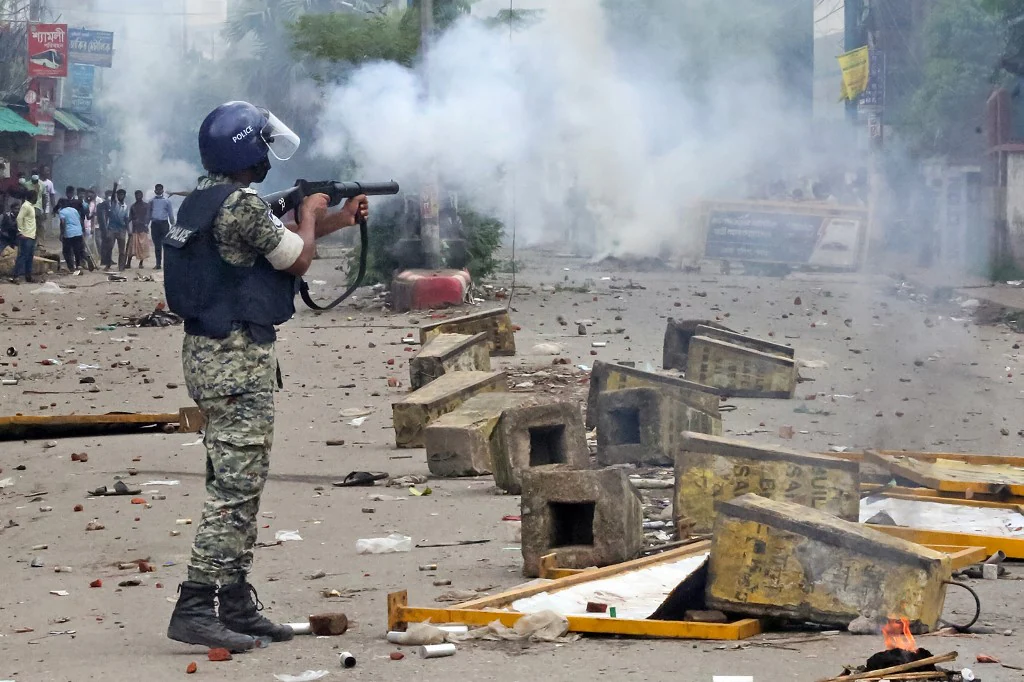Bangladesh Protests 2024: A Turning Point
The Bangladesh protests 2024 have resulted in a significant crisis, with over 300 people reported killed during the ongoing unrest. Prime Minister Sheikh Hasina, a central figure in Bangladesh’s political landscape for over two decades, has recently resigned and left her official residence, Ganabhaban. This period of instability marks a critical moment in Bangladesh’s history, as the nation grapples with widespread dissatisfaction and calls for systemic change.
Causes of the Bangladesh Protests 2024
The Bangladesh protests 2024 were triggered by widespread opposition to a controversial quota system in government jobs. This system, which reserves up to 30% of positions for the families of veterans from Bangladesh’s 1971 war of independence, has been a longstanding source of controversy. Critics argue that it favors supporters of the ruling Awami League party, to the detriment of other qualified candidates. The quota system, initially established in 1972 and briefly abolished in 2018, has been reinstated, leading to renewed public outcry.
Protesters demand the abolition of this system, advocating for a merit-based approach to government employment. The issue has become a focal point for broader dissatisfaction with the government’s handling of various issues, including corruption and lack of transparency.

Evolution of the Bangladesh Protests 2024
Initially focused on the quota system, the Bangladesh protests 2024 have evolved into a larger anti-government movement. This movement has gained support from diverse sections of society, including students, artists, and professionals. Social media has played a crucial role in spreading awareness and galvanizing public opinion, with hashtags, videos, and music amplifying calls for Sheikh Hasina’s resignation.
The legitimacy of Hasina’s administration has been questioned, particularly after the ruling party secured a fourth consecutive term in an election boycotted by the main opposition, the Bangladesh Nationalist Party (BNP). Allegations of power consolidation, manipulation of state institutions, and suppression of dissent have further fueled public anger, making the Bangladesh protests 2024 a pivotal moment for the country’s political future.
Violence and Government Crackdown
The Bangladesh protests 2024 have seen significant violence, especially on a recent Sunday when police clashed with demonstrators across the country. The use of tear gas and rubber bullets resulted in at least 98 fatalities and numerous injuries, marking one of the deadliest days in the nation’s recent history. The violence has not been limited to the capital, Dhaka, but has spread to other regions, including Sirajganj, Munsiganj, Pabna, Feni, Lakshmipur, and Rangpur.
Government installations, police stations, and offices of the ruling Awami League have been targeted and vandalized. In response, the government imposed an indefinite nationwide curfew, shut down high-speed internet services, and declared a three-day general holiday. These measures, while aimed at controlling the situation, have also led to concerns about censorship and restricted communication.
International Response and Future Implications
The international community has expressed concern over the Bangladesh protests 2024, with countries like India issuing travel advisories to their nationals. The global response highlights the potential regional and international implications of the ongoing crisis. As the situation continues to develop, the focus remains on how the Bangladeshi government will address the demands of the protesters and navigate this period of instability.
For insights into the international reaction and potential regional impact, read this report (DoFollow external link). For more details on the causes and progression of the Bangladesh protests, refer to this NDTV article
The Bangladesh protests 2024 reflect a broader discontent with the current political system and a strong desire for change. As the protests continue, they are likely to shape the nation’s political landscape, influencing future governance and policies. The outcome of these protests will be crucial in determining Bangladesh’s path forward, potentially leading to significant reforms and a new political order.




